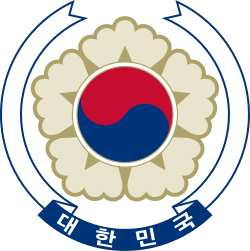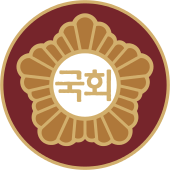South Korean legislative election, 1988
 |
| This article is part of a series on the politics and government of South Korea |
| Constitution |

|
|
Judiciary 
|
Parliamentary elections were held in South Korea on 26 April 1988.[1] The result was a victory for the Democratic Justice Party, which won 125 of the 299 seats in the National Assembly. Voter turnout was 75.8%.
Parties
The governing Democratic Justice Party (DJP) recently elected President Roh Tae-woo. While remaining the largest party, the DJP lost its absolute parliamentary majority, which is the first for a ruling party. The party was hindered by a stronger opposition and the unpopularity of former party leader and President Chun Doo-hwan.
The opposition Party for Peace and Democracy led by veteran opposition leader Kim Dae Jung had a strong showing. It come in a distant second but overtook its rival, the opposition Reunification Democratic Party (RDP), to become the largest parliamentary opposition party. This was vindication for Dae Jung, who came third behind both Roh Tae-woo and Kim Young-sam in the South Korean presidential election, 1987.
For Kim Young-sam and the Reunification Democratic Party the election was a major setback. The party came a distant third, this was after Kim had placed second in the first democratic presidential elections, just ahead of Dae Jung.
The New Democratic Republican Party (NDRP) led by former prime Minister Kim Jong-pil came a distant fourth. However, thanks to the failure of the DJP to win an absolute majority, the oppositions emerged as the major powerbrokers in the new National Assembly.
In 1990, the DJP merged with the parties of Kim-Young Sam and Kim Jong-Pil to form the Democratic Liberal Party, with the former becoming its nominee in the 1992 presidential elections.
Results
| Party | Votes | % | Seats | +/– |
|---|---|---|---|---|
| Democratic Justice Party | 6,675,494 | 34.0 | 125 | –23 |
| Reunification Democratic Party | 4,680,175 | 23.8 | 59 | New |
| Party for peace and democracy | 3,783,279 | 19.3 | 70 | New |
| New Democratic Republican Party | 3,062,506 | 15.6 | 35 | New |
| Hangyore Democratic Party | 251,236 | 1.3 | 1 | New |
| People's Party | 65,650 | 0.3 | 0 | New |
| Korean National Party | 65,032 | 0.3 | 0 | –20 |
| New Korea Democratic Party | 46,877 | 0.2 | 0 | –67 |
| Democratic Korea Party | 32,799 | 0.2 | 0 | –35 |
| Korean Justice Party | 25,433 | 0.1 | 0 | New |
| Third Generation Party | 16,148 | 0.1 | 0 | New |
| Han Ideology Reunification Korean Party | 3,756 | 0.0 | 0 | New |
| Unificational Socialist Party | 3,267 | 0.0 | 0 | New |
| Christian Holy People's Party | 2,247 | 0.0 | 0 | New |
| Independents | 933,161 | 4.8 | 9 | +5 |
| Invalid/blank votes | 208,775 | – | – | – |
| Total | 19,850,815 | 100 | 299 | +23 |
| Source: Nohlen et al. | ||||
References
- ↑ Dieter Nohlen, Florian Grotz & Christof Hartmann (2001) Elections in Asia: A data handbook, Volume II, p420 ISBN 0-19-924959-8
External links
- 1988 elections in South Korea Inter-Parliamentary Union
